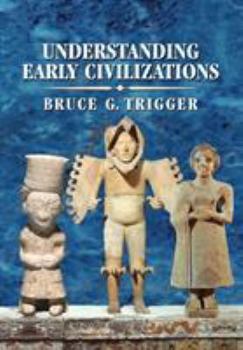Understanding Early Civilizations: A Comparative Study
Select Format
Select Condition 
Book Overview
Arising independently in various parts of the world, early civilizations--the first class-based societies in human history--are of importance to social scientists interested in the development of... This description may be from another edition of this product.
Format:Paperback
Language:English
ISBN:0521705452
ISBN13:9780521705455
Release Date:April 2007
Publisher:Cambridge University Press
Length:774 Pages
Weight:2.95 lbs.
Dimensions:1.6" x 6.8" x 9.2"
Related Subjects
Ancient Early Civilization History Politics & Social Sciences Social Science Social SciencesCustomer Reviews
3 ratings
Challenging comparative history
Published by Thriftbooks.com User , 15 years ago
History can be written in many different ways. Many books on ancient history put an excessive focus on political events, with endless sequences of "Prince A inherited the kingship from his father B, but was soon assassinated by usurper C". Other books focus on very narrow topics which do not yield much information of general interest. You will not understand much of ancient societies by collecting bare facts from books like that. Bruce Trigger's book is the antithesis of narrowly focused history. It is a superb comparison of seven early civilizations on many different levels (as you can see from the table of contents). The primary historical sources from these civilizations are not directly comparable, but Trigger's critical analysis of secondary literature is, to my knowledge, the most complete comparative synthesis ever written on this topic. Needless to say, nobody can be an expert on seven different civilizations. But on the other hand, the benefits of having just one author is that the analysis remains consistent across civilizations, which is a prerequisite for making meaningful comparisons. As a result, this book is much more informative than multi-author collections where each author has chosen his own approach to his "own" civilization. But I think the biggest positive in this book is that Trigger is well acquainted with modern anthropological thought. Especially in the introduction and the concluding chapters, the combination of comparative history and cultural anthropology produces a wealth of insights. It is particularly interesting to learn how a small elite excercised extensive control over the common people in all of these early civilizations, and how this relationship formed the basic structure of society. The one problem I encountered when reading this book was that seven civilizations is a large number. When you compare this many units to eachother, in most instances the comparison inevitably takes the form of a list (listing the characteristics of civ1, then civ2, civ3 and so on). There's nothing wrong with that, but reading information in list form can be a bit tedious and requires a lot of concentration. I recommend this book to people who have a serious interest in ancient history and are determined to learn as much as possible on this subject. The title of this book is highly appropriate. After reading this book you will definitely be on your way toward understanding early civilizations.
For grad school and professionals
Published by Thriftbooks.com User , 16 years ago
An excellent book for the serious academic interested in the subject. Not suitable as a classroom text, because of the level of knowledge required, as well as the length and complexity of the volume.
A great comparative review of early civilizations
Published by Thriftbooks.com User , 20 years ago
In the last few years I have tried and read books offering a broad scope and general overviews of history, sociology, anthropology and religion (you may well say that globalization has reached social science too). With that aim in mind, I have read this book.The description on the approach of the book provided by the "Book reviews" is fairly accurate. Therefore, I will only point out that this book shows both the depths of the present state of knowledge and ignorance on the matter: all relevant issues of 7 early civilizations are compared and the conclusions are basically negative, i.e., current rival explanations are shown to be defective, and the author expects that psychology and the neurosciences may help to provide for better explanations in the future, but the author does not set forth any new paradigma or global explanation on the subject.Although the content is very interesting, the book often happens to be a tough reading; therefore I have rated the book as a 4 start book(content: 5 starts; pleasure of reading: 3 to 1).Other books I would recommend to read are the following: "The Dynamics of Global Dominance. European Overseas Empires 1415-1980", by David Abernethy, the trilogy on the Information Age ("The Rise of the Network Society", "The power of Identity", "End of Millennium") by Manuel Castells, "Pre-industrial societies" by Patricia Crone, "The History of Government" by S.E. Finer, "Power and privilege" by Gerhard Lenski, "The world economy. A millennial perspective" by Angus Maddison, "The Rise of the West" by William H. McNeill, "The Phenomenon of Religion", by Moojan Momen and "World History. A new perspective" by Clive Ponting.





